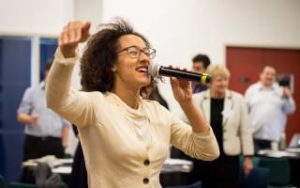Latest news
SDGeneration: A Citizen Science Movement
February 27, 2019
On 13th February, LIDC and the Institute for Global Prosperity, UCL (IGP) welcomed over 100 attendees to a large-scale, participative conference. Entitled “SDGeneration: A Citizen Science Movement”, the event explored a citizen-science approach to monitoring and evaluating the Sustainable Development Goals (SDGs). The conference also examined the support necessary to achieve the SDGs’ aspirations.
LIDC Director, Professor Claire Heffernan, opened the day with a warm welcome to our attendees. Her presentation stressed that monitoring the SDGs will cost an additional US$340 million per year. From there, IGP Director, Professor Henrietta Moore, reflected on how the international community could galvanise young people to monitor and evaluate the SDGs. Cameron Holleran, IGP Poet in Residence, then recited an inspiring poem entitled “Seize the Present.”
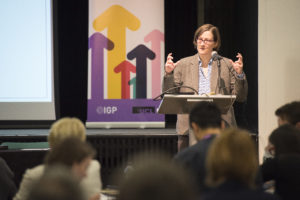
Professor Claire Heffernan, LIDC
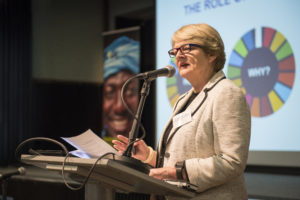
Professor Henrietta Moore, IGP
Following this, we were thrilled to welcome Dr David Nabarro as our keynote speaker. Dr Nabarro gave a broad and comprehensive overview of the rationale behind the SDGs. He emphasised that the SDGs apply across countries in the global North and South. In addition, Dr Nabarro also called on stakeholders to collaborate to achieve the SDGs’ ambitious agenda.
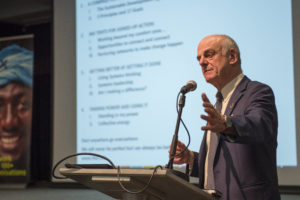
Dr David Nabarro
From there, our facilitator, David Bent of the IGP, introduced our high-level panel, which focused on ecosystems of support for the SDGs. First of all, Dr. Joanna Newman, Chief Executive and Secretary General of the Association for Commonwealth Universities, discussed universities’ vital role in educating global citizens. Rachel Stephenson Sheff, Advisor, Lightful, then discussed the challenges and opportunities involved in inclusive philanthropy.
Following Rachel, Dave Hughes, Global Head of Technology Scouting, Syngenta, discussed his organisation’s Good Growth Plan. He also noted that fear is preventing many companies from engaging fully with the SDGs. Olivia Sibony, Head of Impact Crowdfunding, SeedTribe, then explored innovative and sustainable entrepreneurship. To round off the panel, we heard from Leanne Armitage, CEO of the Armitage Foundation. She discussed her organisation’s work to increase the number of students from underrepresented backgrounds into medical school.
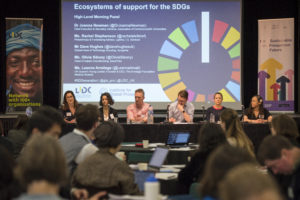
Our high-level morning panel
Following this great panel discussion, the winning team from Hack 4 the UN SDGs presented their winning solution, Panidesh.
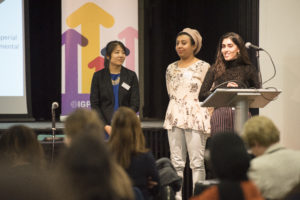
Pani-Desh presents its winning solution
Just before lunch, we were delighted to welcome performer, Corina Kwami, who regaled us with tales of jazz performers and civic duty.
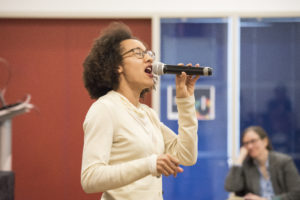
Corina Kwami
After a networking lunch, our second keynote speaker, Professor Jacqueline McGlade of the IGP, gave a stirring presentation on “Regenerating the Planet”. She reminded attendees that “a lot of people get lost in the enormity of the SDGs. As a result, citizen science needs to step up!” Nevertheless, Professor McGlade noted that we do need to empower general publics to help monitor the SDGs without them “feeling like cheap labour.”
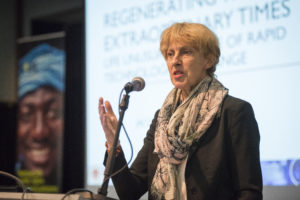
Professor Jacquie McGlade, IGP
Afterwards, we launched into our second panel discussion, which explored Citizen-Science Action on the SDGs. First of all, Enass Abo-Hamed, CEO at H2GO Power and Royal Academy of Engineering Enterprise Fellow, discussed her innovative work to provide reliable and low-cost energy to low-income populations.
Following this, Dr Adam Kucharski, Associate Professor, London School of Hygiene & Tropical Medicine, explored his varied citizen science work, especially with young people on influenza transmission. He emphasised that this research method has helped him grow as a researcher and understand young people’s concerns. Our third speaker, Brooke Simmons of Zooniverse, explored her organisation, which is known as the world’s biggest citizen science project. She stressed that that authenticity is key to engaging volunteers in citizen science work. Our last speaker, Professor Muki Haklay, of UCL discussed his project, Extreme Citizen Science.
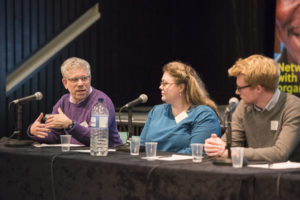
Our afternoon high-level panel
After a short break, participants took part in four stimulating workshops convened by UKCDR, SDSN Youth, the World Food Programme, and the Commonwealth. These explored topics from research and higher education in achieving the SDGs, the key roles of the Commonwealth and WFP, to identifiying indicators for measurement.
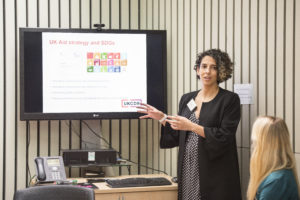
Marta Tufet, Executive Director, UKCDR, delivers a workshop
Following the workshops, David Bent gave an observation on the day’s key themes, which included the pivotal role of universities as a resilient source of information. Professor Heffernan and Professor Moore then reflected on what more we needed to do to empower the SDGeneration, and thanked guests for attending.
We are grateful to our attendees, distinguished speakers and workshop leaders for helping make the event a success. Most of all, special thanks go to the IGP for their outstanding partnership on such a special day.
